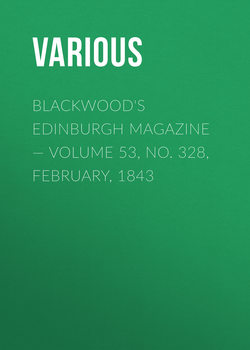Читать книгу Blackwood's Edinburgh Magazine — Volume 53, No. 328, February, 1843 - Various - Страница 3
POEMS AND BALLADS OF SCHILLER RUDOLPH OF HAPSBURG.—A BALLAD
Оглавление[Hinrichs properly classes this striking ballad (together with the yet grander one of the "Fight with the Dragon") amongst those designed to depict and exalt the virtue of Humility. The source of the story is in Ægidius Tschudi—a Swiss chronicler—and Schiller (who, as Hinrichs suggests,) probably met with it in the researches connected with the compositions of his drama, "William Tell," appears to have adhered, with much fidelity, to the original narrative.]
At Aachen, in imperial state,
In that time-hallow'd hall renown'd,
At solemn feast King Rudolf sate,
The day that saw the hero crown'd!
Bohemia and thy Palgrave, Rhine,
Give this the feast, and that the wine;
The Arch Electoral Seven,
Like choral stars around the sun,
Gird him whose hand a world has won,
The anointed choice of Heaven.
In galleries raised above the pomp,
Press'd crowd on crowd, their panting way;
And with the joy-resounding tromp,
Rang out the million's loud hurra!
For closed at last the age of slaughter,
When human blood was pour'd as water—
LAW dawns upon the world!6
Sharp Force no more shall right the wrong,
And grind the weak to crown the strong—
War's carnage-flag is furl'd!
In Rudolf's hand the goblet shines—
And gaily round the board look'd he;
"And proud the feast, and bright the wines,
My kingly heart feels glad to me!
Yet where the lord of sweet desire,
Who moves the heart beneath the lyre,
And dulcet Sound Divine?
Dear from my youth the craft of song,
And what as knight I loved so long,
As Kaisar, still be mine."
Lo, from the circle bending there,
With sweeping robe the Bard appears,
As silver, white his gleaming hair,
Bleach'd by the many winds of years:
"And music sleeps in golden strings—
The minstrel's hire, the LOVE he sings;
Well known to him the ALL
High thoughts and ardent souls desire!—
What would the Kaisar from the lyre
Amidst the banquet-hall?"
The Great One smiled—"Not mine the sway—
The minstrel owns a loftier power—
A mightier king inspires the lay—
Its hest—THE IMPULSE OF THE HOUR!
As through wide air the tempests sweep,
As gush the springs from mystic deep,
Or lone untrodden glen;
So from dark hidden fount within,
Comes SONG, its own wild world to win
Amidst the souls of men!"
Swift with the fire the minstrel glow'd,
And loud the music swept the ear:—
"Forth to the chase a Hero rode,
To hunt the bounding chamois-deer:
With shaft and horn the squire behind:—
Through greensward meads the riders wind—
A small sweet bell they hear.
Lo, with the HOST, a holy man,—
Before him strides the sacristan,
And the bell sounds near and near.
The noble hunter down-inclined
His reverent head and soften'd eye,
And honour'd with a Christian's mind
The Christ who loves humility!
Loud through the pasture, brawls and raves
A brook—the rains had fed the waves,
And torrents from the hill.
His sandal shoon the priest unbound,
And laid the Host upon the ground,
And near'd the swollen rill!
"What wouldst thou, priest?" the Count began,
As, marvelling much, he halted there.
"Sir Count, I seek a dying man,
Sore hungering for the heavenly fare.
The bridge that once its safety gave,
Rent by the anger of the wave,
Drifts down the tide below.
Yet barefoot now, I will not fear
(The soul that seeks its God, to cheer)
Through the wild wave to go!"
He gave that priest the knightly steed,
He reach'd that priest the lordly reins,
That he might serve the sick man's need,
Nor slight the task that heaven ordains.
He took the horse the squire bestrode;
On to the chase the hunter rode,
On to the sick the priest!
And when the morrow's sun was red,
The servant of the Saviour led
Back to its lord the beast.
"Now Heaven forefend," the hero cried,
"That e'er to chase or battle more
These limbs the sacred steed bestride,
That once my Maker's image bore!
But not for sale or barter given;
Henceforth its Master is the Heaven—
My tribute to that King,
From whom I hold as fiefs, since birth,
Honour, renown, the goods of earth,
Life, and each living thing."
"So may the God who faileth never
To hear the weak and guide the dim,
To thee give honour here and ever,
As thou hast duly honour'd Him!
Far-famed ev'n now through Switzerland
Thy generous heart and dauntless hand;
And fair from thine embrace
Six daughters bloom—six crowns to bring—
Blest as the Daughters of a KING—
The Mothers of a RACE!"
The mighty Kaisar heard amazed;
His heart was in the days of old:
Into the minstrel's eyes he gazed—
That tale the Kaisar's own had told.
Yes, in the bard, the priest he knew,
And in the purple veil'd from view
The gush of holy tears.
A thrill through that vast audience ran,
And every heart the godlike man,
Revering God, reveres!
6
Literally, "A judge (ein richter) was again upon the earth." The word substituted in the translation, is introduced in order to recall to the reader the sublime name given, not without justice, to Rudolf of Hapsburg, viz., "THE LIVING LAW."
